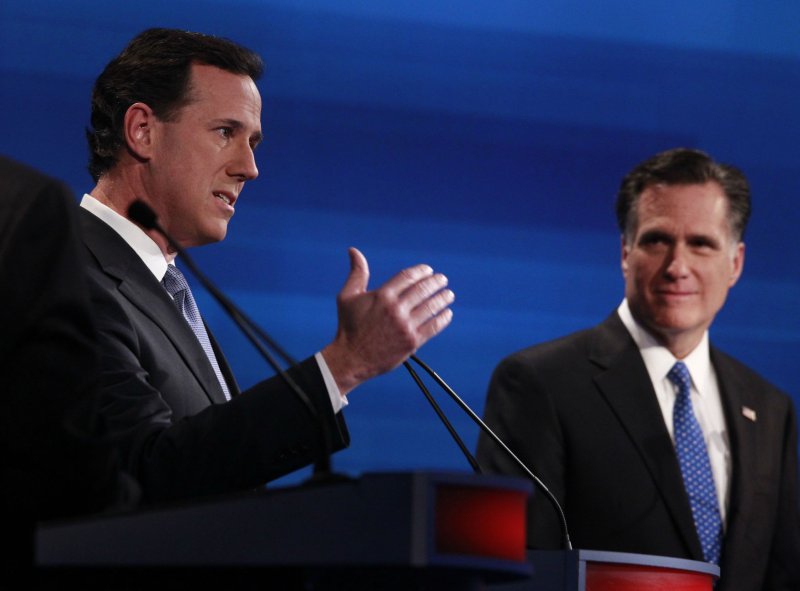The Republican primary race has come down to a two-man contest: former Pennsylvania Sen. Rick Santorum (L) versus former Massachusetts Gov. Mitt Romney. Wednesday's contest in Wisconsin may be do or die for Santorum at this point in the delegates sweepstates. Jan. 16 file photo. UPI/Charles Dharapak/Pool |
License Photo
Wisconsin voters are used to being involved in significant statewide elections, but this Tuesday they will play a role on the national stage when they vote in the Republican presidential primary.
Political experts say the 42 delegates in Wisconsin's winner-take-all primary could either knock out former U.S. Sen. Rick Santorum of Pennsylvania or carry him further in his battle against front-runner Mitt Romney to be the party's presidential nominee.
Santorum got a boost March 24 when he claimed the Louisiana primary where he took 49 percent of the vote to Romney's 27 percent.
However, Romney still has double the number of delegates Santorum has to reach 1,144 delegates needed to secure the nomination at the Republican National Convention in Tampa, Fla., in August. RealClearPolitics.com indicates Romney has 565 delegates to Santorum's 256. Fast-fading former House Speaker Newt Gingrich, who downsized his staff and cut back on public appearances, has 141 delegates and U.S. Ron Paul of Texas, who also scaled back his speaking engagements, has 66.
Political experts in the Badger State say a Romney win basically could button down the nomination, MenomonieFallsPatch.com reported. Maryland and the District of Columbia also will hold primaries Tuesday,
"The math is very hard for Santorum if he doesn't win this state [Wisconsin]," said Charles Jacobs, an assistant political science professor at St. Norbert College in De Pere. "Not only is it more likely he will not have the needed delegates before Tampa, if he doesn't win in Wisconsin, he will have lost in three important swing states in the Midwest."
Twenty-four of Wisconsin's votes are awarded based on totals in each of the state's eight congressional districts, and the remaining 18 go to the statewide winner, the Central Wisconsin Hub said.
The Louisiana win gave Santorum's campaign some momentum heading into Wisconsin. Santorum picked up delegates with wins in Kansas, Mississippi and Alabama. But he experienced double-digit losses in Illinois, Michigan and bellwether Ohio to Romney.
"Saying his back is against the wall is probably accurate. If he can't win in Wisconsin it becomes prohibitively impossible for him to get the needed delegates," John McAdams, a political science professor at Marquette University, told MenomonieFallsPatch.com.
Nationally, a RealClearPolitics.com's aggregate analysis indicated Romney had a 12 percentage point lead over Santorum, 39 percent to 27 percent. A Marist-NBC News poll Friday indicated Romney held a 40 percent-to-33 percent lead over Santorum.
The former Pennsylvania senator said he would stump "up and down" the state to try to pull off a win, public radio WUWM-FM, Milwaukee, reported.
"I think we'll do well obviously in the rural areas here and we hope to be able to excite voters and we're going to work up and down the state and if we can pull off one of those -- we've come so close so often -- if we can maybe pull one off, again, that undermines this inevitability argument" that Romney's campaign has been making, Santorum said on the stump.
Santorum bills himself as the only true conservative in the campaign, painting Romney as a moderate in conservative's clothing. The former U.S. senator also praised Republican Gov. Scott Walker -- who's subject to a recall election -- and his move to strip public unions of most of their collective bargaining rights.
Throughout Wisconsin, Santorum told supporters he was still a viable candidate in the race, TalkingPointsMemo.com said.
"I'm not running as the conservative candidate for president," Santorum said at one stop. "I am the conservative candidate for president."
Still with nearly double the delegates over his nearest competitor, Romney's campaign has shifted its focus from his primary rivals to Election Day foe Barack Obama.
RealClearPolitics.com pointed out Romney previously seemed close to wrapping up his party's nomination only to see challenges from Gingrich, Santorum and Paul emerge. Now there's a sense things may be different as the primary season crossed its midpoint.
Sources told RealClearPolitics.com Romney's top advisers met in Boston recently to kick off a delegate management procedure meant to ensure delegates won by Romney stay with Romney.
With states favorable to Romney looming -- and with winner-take-all primaries replacing proportional allocation as the norm -- his campaign said it was preparing to pump up the volume on its calls for the remaining GOP contenders to step aside.
"We have gotten even greater clarity about the race this week," Romney spokesperson Andrea Saul told the political Web site last week. "Gov. Romney is well on his way to clinching the nomination while our opponents have admitted they're only in the race to be spoilers."
The Wisconsin Government Accountability Board, which oversees elections, predicted as much as 35 percent of the population eligible to vote -- about 1.5 million -- will do so Tuesday.
"We expect turnout in this election to be similar to the February 2008 presidential preference primary," Kevin Kennedy, the board's director and general counsel, said in a release. "The Republican presidential nomination is still very contested, just as the Democratic nomination was very contested when Wisconsin voted in 2008."
Wisconsin's open primary system does not require voters to declare a party but presidential preference primary voters may only vote for a presidential candidate of one party.















